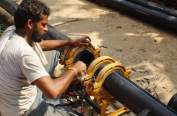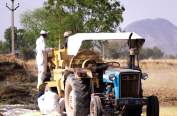



India’s independent policy think tank space is growing fast. Yet we find that there is a dearth of research support to state government departments, both for formulating policy decisions and for improving governance1 2. This is especially true of environment and sustainability policymaking. Independent think tanks must go sub-national to fill this critical knowledge support gap; their unbiased, holistic, and context-specific support is vital for strengthening India’s public policy process at the state level. But what is it like to work with state government departments and agencies? What should researchers understand about ground-level policy work before undertaking public sector collaborations?
We have some useful answers. We are young policy researchers at the Council on Energy, Environment and Water (CEEW) who collaborate frequently with state government departments on projects related to energy access and the power sector. We feel our experiences, though modest, offer valuable insights for students and practitioners of public policy, and especially researchers working with state-level actors. We are motivated by the goals with which we began our careers: changing the status quo and influencing reforms on the ground. In the CEEW spirit of fighting ignorance and helping raise the bar, we have distilled what we have learned from our government engagements into the five following mantras:
1. To build trust, be patient and consistent.
Convincing a government agency to work with you can be challenging. Many state-level officials are still unaware of the concept of independent policy think tanks; they might react to your pitch with suspicion or confusion. How can someone work with them for free? Will you deliver? Do you have a hidden agenda? You might also hear the common refrain that think tanks are unaware of ground realities. If you face any of this, be patient. Listen more. Be open about what you do not know.
Only through consistent engagement and honest efforts to understand your field better can you win over hesitant official. If you are not already based in the state where you wish to work, prepare to travel frequently – like we did. There is no way around this. Meeting state government officials in person is still the most effective way to communicate your ideas to them; emails and virtual interactions are just not as effective. Pro tip: a sense of humour can go a long way in building rapport. So keep it light, whenever possible!
2. Progress is incremental, so persevere and practise dispassion.
Once you have secured trust, more challenges await. For instance, all your efforts might not directly impact the government’s ultimate decisions, or officials may be too pressed for time for detailed conversations on your hard-earned research insights. So the onus is on you to set realistic expectations at the outset. You might also be asked for clerical assistance outside the scope of your work plan. While such situations can be tricky, you will often have to walk the extra mile. It is easy to feel disillusionment, but your efforts will pay off if you persevere. Trust us. The validation you feel when a government official publicly commends you for your efforts is unmatched.
3. Engage with institutions, not officers.
Institutions are permanent; individuals are not. Officers are transferred all the time, so build connections across the hierarchy. You will often get things done faster by engaging with subordinate officials and clerks instead of senior officials. Having a good network within the staff can also help you dispassionately evaluate promises made by officers – some of whom tend to over-commit – and plan accordingly. Finally, while you should maintain quality interactions with everyone, know when to draw the line.
4. Keep broadening your network.
Diversify your engagements. Build networks in departments that have remote connections to your work, and not just the one that you engage with on a regular basis. Doing so can help broaden your perspective on the policy issue you study and give you a sense of the state government’s priorities.
Besides, having good connections can come in handy in difficult situations. When one of us was struggling to make progress on a solar pump project, aligning the project concept with an existing flagship programme and sending a simple information request to the Chief Minister’s advisor in charge of the programme helped move the needle.
5. Adapt to circumstances.
Your strategy for public sector partnerships should be highly adaptable. Government actors can be highly unreliable partners, and their changing political priorities can significantly impact your deliverables. So keep abreast of developments within and outside government and have an open mind. We owe some of our most satisfying wins to our willingness to rethink our objectives and quickly align them to the government’s priorities.
The proof of policy design is in impact. To translate academic rigour to on-ground impact, researchers need to approach government engagements with a practical, flexible mindset. We hope our five mantras can help our peers and future policy researchers do just that.
Anas Rahman and Kanika Balani are Programme Associates at the Council on Energy, Environment and Water (CEEW), an independent, not-for-proft policy research institution. Send your comments to [email protected]
Banner Image Source: CEEW; Discussing consumers' concerns with electricity services in Mahdoiya panchayat, Malihabad, Lucknow district
1 Regional Research Institutions and Think-Tanks: Why are they Missing? http://www.ipcs.org/comm_select.php?articleNo=4147
2 Our think-tanks are too Delhi-centric https://www.thehindubusinessline.com/opinion/Our-think-tanks-are-too-Delhi-centric/article20536661.ece






Add new comment